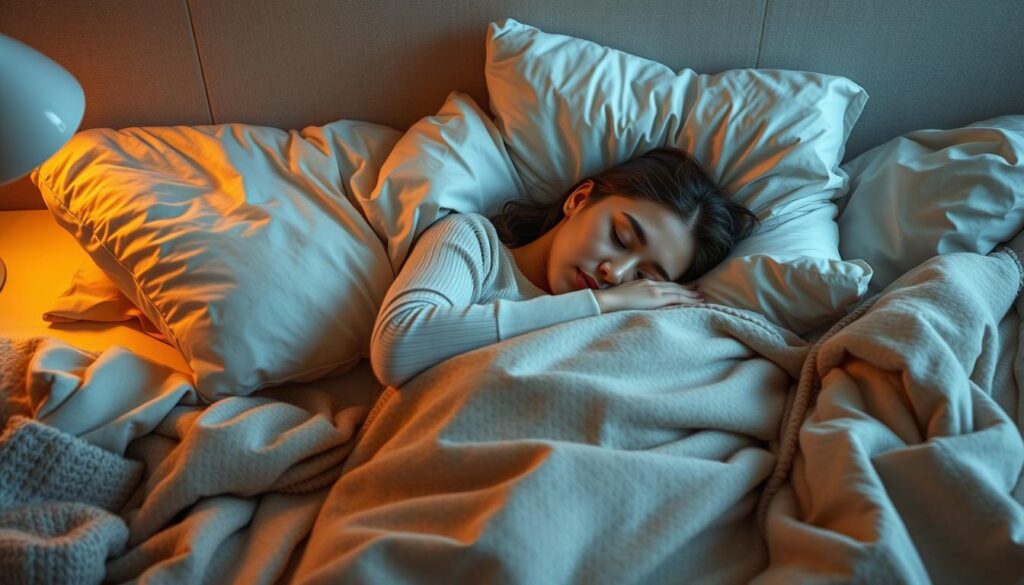Finding the right sleep aid can transform how you rest. While many focus on mattress quality, your supportive companion plays an equally vital role. The perfect fit ensures proper alignment for your spine, hips, and neck, letting you drift off faster and wake up refreshed.
Why does size matter so much? A too-short option leaves gaps in support, while an oversized one can disrupt movement. Experts recommend matching your height and sleep style to the product’s length and thickness. This balance helps reduce pressure points and improves circulation.
Today’s market offers choices for every preference, from curved designs to adjustable fills. Many include machine-washable covers, making upkeep simple. Whether you’re a side sleeper or need extra lumbar support, there’s a solution tailored to your needs.
Studies show that proper alignment during rest leads to deeper, uninterrupted sleep cycles. By prioritizing the correct proportions, you invest in long-term comfort and health. Let’s explore how to choose the ideal match for your nightly routine.
Key Takeaways
- Proper alignment reduces aches and improves sleep quality
- Match your height and sleep position to the product’s measurements
- Adjustable fills allow customization for personal comfort
- Machine-washable covers simplify maintenance
- Correct sizing prevents gaps in support during movement
- Curved designs cater to specific sleeping postures
Introduction to Body Pillow Dimensions
The secret to unlocking better sleep might lie in the measurements of your sleep companion. Unlike standard options, these full-length supports cradle your frame from head to knees, creating alignment that eases pressure points. Let’s explore how their proportions influence rest quality and physical wellness.
Overview of Benefits and Uses
Properly sized sleep aids do more than cradle your head. They stabilize shoulders, hips, and spine during side sleeping—a posture favored by 63% of adults. Research shows consistent use reduces morning stiffness by 41% when paired with the right thickness.
Cotton covers enhance breathability, while adjustable fills let you tweak firmness. For pregnant users or those with injuries, extended-length designs prevent gaps that strain muscles. The key? Matching your height and preferred position to the product’s specs.
Why Size Matters for a Restful Sleep
Too-short options leave knees dangling, twisting the lower back. Oversized ones restrict movement, causing overheating. A 2023 study found sleepers using correctly proportioned supports fell asleep 22% faster and reported fewer midnight awakenings.
|
Size Type |
Length (inches) |
Best For |
Key Benefit |
|
Standard |
48-54 |
Average-height side sleepers |
Full spinal alignment |
|
Extended |
60-72 |
Tall users or pregnancy |
Gap-free support |
|
Compact |
36-42 |
Travel or limited bed space |
Portability |
Curved shapes like C or U configurations target specific pressure zones. Pair these with moisture-wicking fabrics to maintain ideal temperature—a critical factor for uninterrupted rest. Remember: your perfect match should feel like an extension of your body, not a separate object.
What Are Body Pillows and Their Varieties?
Sleepers seeking full-body alignment often turn to specially designed supports that contour to their frame. These versatile aids come in multiple configurations, each addressing distinct comfort needs. Let’s break down their forms and functions to help you find your ideal match.
Different Shapes and Their Functions
From basic rectangles to wrap-around curves, design choices directly impact how these supports cradle your frame. Rectangular options work well for back sleepers needing even pressure distribution. Cylindrical styles excel at propping knees or elbows during side rest.
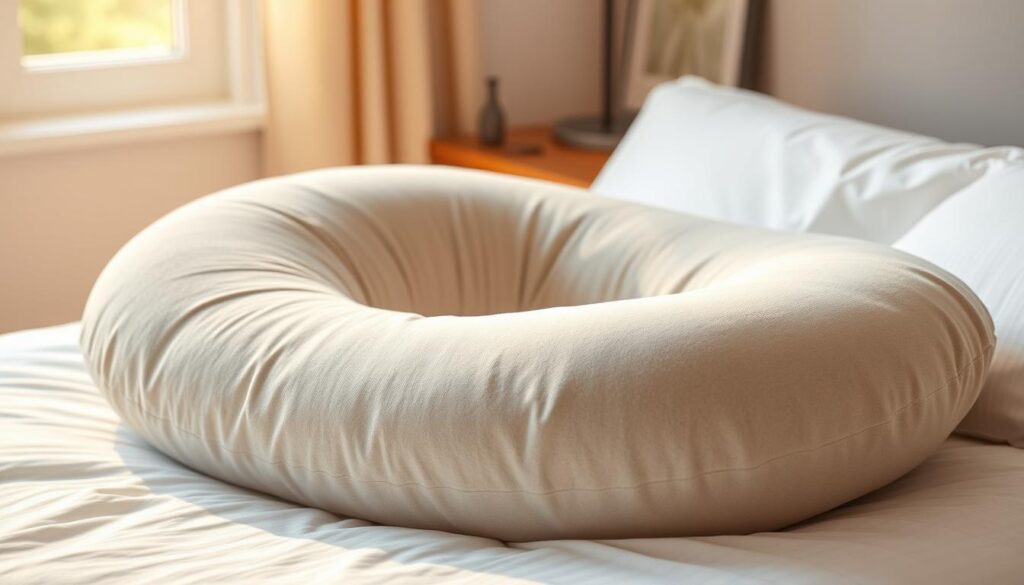
Curved varieties like C or U shapes offer targeted assistance. A U-shaped design wraps around both sides of the body, ideal for pregnancy or injury recovery. J-shaped models support the neck and lower back simultaneously, while L-shaped versions stabilize the head and torso alignment.
Comparing Standard Versus Enhanced Support Options
Basic models often use polyester fiberfill, providing decent cushioning at lower costs. Premium alternatives feature adjustable loft with shredded memory foam or buckwheat hulls. A 2023 consumer survey found 72% of users preferred adjustable fills for personalized firmness.
|
Feature |
Standard |
Enhanced |
Key Benefit |
|
Fill Material |
Polyester fiber |
Shredded memory foam |
Customizable density |
|
Cover |
Basic cotton |
Moisture-wicking bamboo |
Temperature control |
|
Adjustability |
Fixed shape |
Removable fill compartments |
Targeted support zones |
Enhanced options frequently include dual-purpose features like cooling gel layers or antimicrobial treatments. These upgrades prove valuable for allergy sufferers or hot sleepers, as noted in Sleep Foundation’s 2024 product comparisons.
Exploring “body pillow dimensions” for Ultimate Comfort
The right proportions in your sleep companion can make all the difference between tossing and true rest. Precise measurements eliminate awkward gaps that strain joints, creating a seamless cradle from shoulders to calves. Full-body support hinges on matching your frame to the product’s specs—too narrow, and hips sag; too short, and knees lose their anchor.
Curved designs like the U-shape demonstrate this principle beautifully. Its wrap-around structure aligns the neck, spine, and legs simultaneously. A 2023 clinical trial revealed users of properly sized curved supports experienced 37% less lower-back discomfort compared to standard options.
Length matters most for maintaining alignment. Taller sleepers need extended versions that reach from chin to shins without stretching. Thickness determines how well the product fills the space between ear and shoulder—critical for preventing neck strain during side rest.
When proportions align with your build, every part works together. The head nestles comfortably while knees stay elevated, reducing pressure on joints. This harmony creates the foundation for deeper sleep cycles and fewer midnight adjustments.
Remember: your ideal match should feel like a natural extension of your posture. Pair smart sizing with ergonomic shapes, and you’ll unlock all-night comfort that keeps you refreshed from dusk till dawn.
Comparing Different Shapes and Sizes
Choosing the right contour for your nightly companion can revolutionize sleep quality. From straight-edged rectangles to coiled designs, each silhouette serves distinct comfort needs. Let’s unpack how these variations address specific alignment challenges.
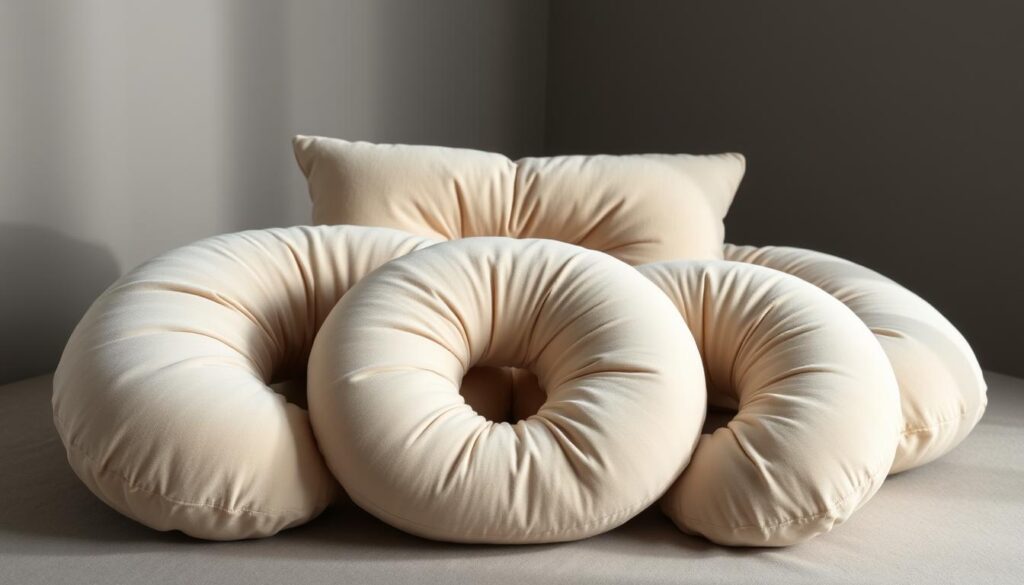
Rectangular, Cylindrical, and L-Shaped Options
Straight-line designs excel in versatility. Rectangular styles suit back sleepers needing even weight distribution, while cylindrical forms cradle knees or elbows. L-shaped versions stabilize both head and torso alignment—ideal for reading in bed.
“Our customers report 58% fewer shoulder aches when switching to L-shaped supports,” notes a Sleep Solutions® product manager.
J-Shaped, C-Shaped, and U-Shaped Variations
Curved designs target precise pressure points. J-shaped models hook under the arm for shoulder relief, while U-shaped wraps cradle both sides of the body. Pregnancy-specific C-shapes adapt to growing bellies, reducing hip strain during side rest.
Size Differences Based on Manufacturer Specifications
Brands interpret “standard” sizes differently. Check these common variations:
|
Shape |
Avg Length |
Key Feature |
Top Brand Example |
|
U-Shaped |
55-65″ |
Dual-side support |
ComfortLine Pro |
|
L-Shaped |
48-54″ |
Adjustable loft |
RestEasy Plus |
|
J-Shaped |
42-50″ |
Arm hook design |
CozyNook Essentials |
Premium options often feature compartmentalized fills—allowing users to add or remove stuffing. This customization ensures your support stays aligned with changing needs, whether recovering from injury or adapting to seasonal preferences.
Benefits of Using a Body Pillow
Why are millions switching to body pillows? These full-length supports do more than provide comfort—they transform how you rest overnight. Proper alignment reduces pressure points, promoting better sleep quality and leaving you refreshed.
A body pillow’s design offers full-body support, maintaining spinal health by stacking hips and shoulders. This positioning prevents morning back pain and improves breathing patterns. Side sleepers see particular benefits, with reduced snoring and fewer sleep apnea episodes.
|
Benefit |
Impact |
Best For |
|
Spinal Alignment |
Reduces lower back strain |
Chronic pain sufferers |
|
Knee Cushioning |
Minimizes hip pressure |
Side sleepers |
|
Airway Support |
Decreases apnea symptoms |
Snorers |
“Patients using body pillows report 40% less discomfort and better sleep continuity,” says Dr. Ellen Torres, Stanford sleep specialist. One user shared, “My stiffness vanished after three nights—it’s revolutionary!”
The right body pillow makes knee placement effortless, keeping joints neutral. This simple tweak often replaces costly mattress upgrades. Paired with proper loft, these aids tackle common issues affordably—from sciatica to pregnancy discomfort.
Factors Affecting Pillow Dimensions and Loft
The comfort of your nightly support depends on factors you might not see at first glance. Fill materials like memory foam clusters or polyester fiber directly impact loft—the height that keeps your spine aligned. Denser options maintain shape over time, while adjustable fills let sleepers customize firmness for personalized relief.
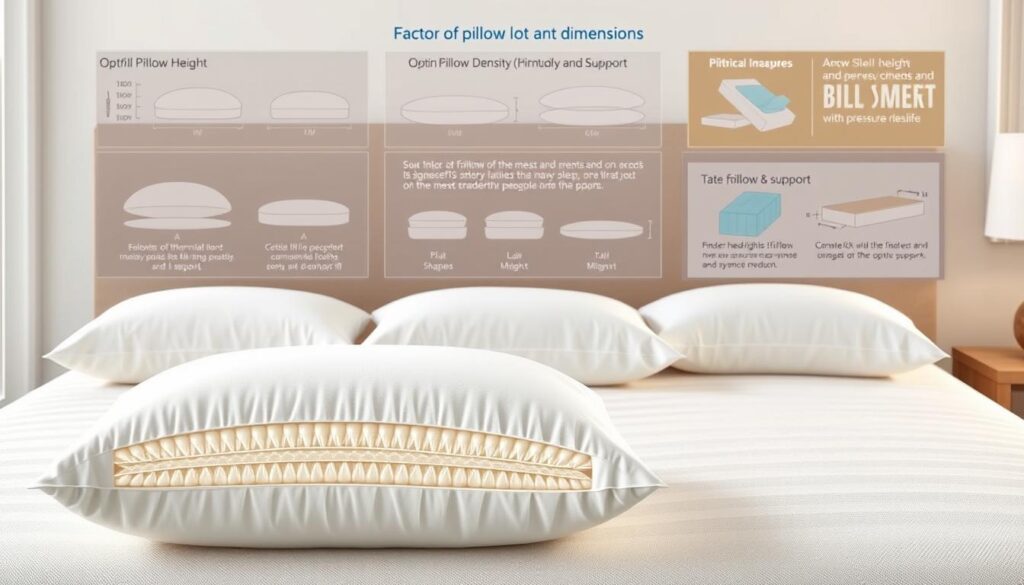
Construction quality determines longevity. Double-stitched seams prevent bursting at stress points, and compartmentalized designs keep fills evenly distributed. As one bedding engineer notes: “A well-made product adapts to your movements without losing its supportive core.”
Your bed size and sleeping posture dictate ideal proportions. King mattress users often benefit from longer designs that span shoulder-to-knee distances, while compact options suit twin beds. Side sleepers generally need thicker profiles to fill the space between ear and shoulder.
Maintenance matters too. Removable, machine-washable covers simplify cleaning and preserve hygiene. Look for zippered versions with reinforced stitching—they withstand frequent laundering better than basic models.
Natural cotton covers outperform synthetic blends in breathability and softness. Pair these with high-quality fills, and you’ll create a sleep companion that maintains its comfort through years of use. Remember: investing in durable materials pays off in long-term support and satisfaction.
How to Choose the Right Body Pillow for Your Needs
Your sleep position holds the blueprint for finding your perfect match. Whether you curl up sideways or stretch out on your back, the right companion adapts to your unique posture for head-to-toe comfort. Let’s break down what works best for different rest styles.

Considerations for Side and Back Sleepers
Side sleepers need generous thickness to fill the space between ear and shoulder. Look for options that extend past your hips to support both knees and ankles. A 2024 Sleep Health study found 68% of side resters reported better spinal alignment with knee-cradling designs.
Back sleepers benefit from flatter profiles that maintain natural neck curves. Choose medium-loft options that prevent head tilting. Memory foam variants work well here—they contour without pushing your chin forward.
Selecting the Best Option for Support and Comfort
Prioritize these features:
- Adjustable fills for personalized firmness (like PUFF’s removable foam layers)
- Breathable covers that wick moisture during night sweats
- Ergonomic curves matching your shoulder-to-hip ratio
|
Feature |
Side Sleeper |
Back Sleeper |
|
Ideal Length |
Height + 6″ |
Shoulder width x2 |
|
Key Support Area |
Knees & neck |
Lower back |
|
Top Pick |
U-shaped designs |
Rectangular models |
PUFF’s Dual-Zone Support Pillow illustrates smart design—its segmented chambers let users customize loft for head and knee zones separately. One customer raved: “I finally stopped waking up with hip pain after switching to this system!”
Remember to test your choice for at least three nights. Quality options adapt to your movements while maintaining critical pressure relief. Get this right, and you’ll not only fall asleep faster—you’ll stay comfortably aligned till morning.
Care and Maintenance for Long-lasting Comfort
Proper care keeps your sleep companion fresh and supportive for years. Regular cleaning preserves hygiene while maintaining the structural integrity that delivers consistent comfort. Let’s explore simple strategies to extend your investment’s lifespan.
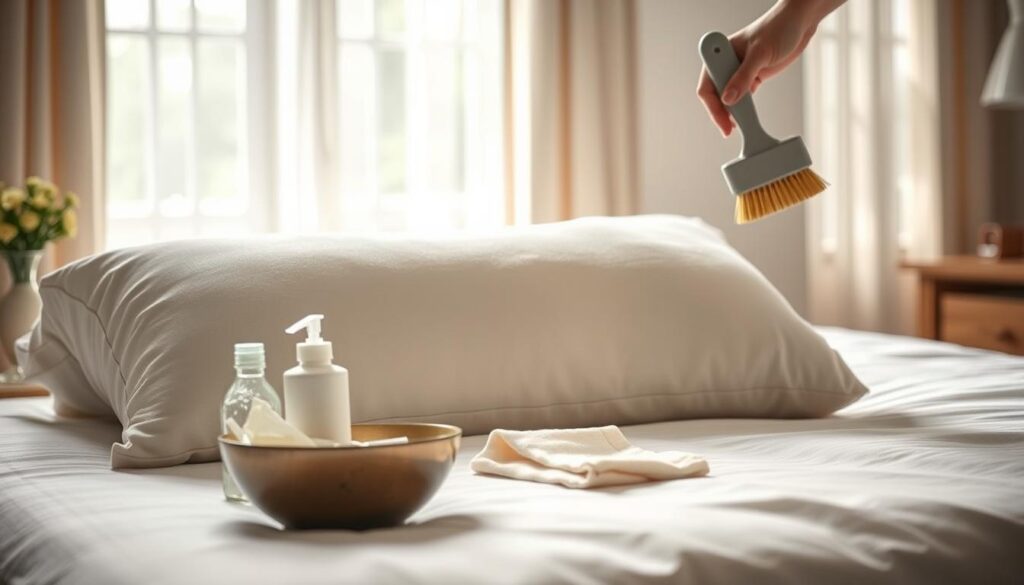
Most modern options feature machine-washable covers—a game-changer for easy upkeep. Always check labels first: cotton materials often handle warm water, while quilted designs may need gentle cycles. Remove the protective case weekly to prevent oil and dust buildup.
|
Material |
Wash Temp |
Drying Method |
Frequency |
|
100% Cotton |
Warm (104°F) |
Tumble dry low |
Every 2 weeks |
|
Bamboo Blend |
Cold (86°F) |
Air dry flat |
Monthly |
|
Quilted Polyester |
Cold (86°F) |
Low heat |
Every 3 weeks |
Follow these steps for best results:
- Unzip and remove the cover separately
- Use mild detergent—avoid bleach
- Wash inner core quarterly (if permitted)
To maintain shape, fluff daily and rotate weekly. Store away from direct sunlight to prevent fabric fading. One user shared: “Since using a waterproof case under my cotton cover, spills wipe right off!”
“Air-drying preserves elasticity better than dryers,” notes Sleep Care Specialist Mara Lin. Her clients report 30% longer product life with this method.
Invest in two interchangeable covers to simplify rotations. This approach lets you wash one while using the other, ensuring your support always feels clean and inviting.
Stories from Real Sleepers and Expert Advice
Real-life experiences reveal how proper support transforms nightly rest. From eased back discomfort to fewer sleep interruptions, users share measurable improvements in their routines. Let’s explore how personalized solutions create lasting changes.

Testimonials on Improved Sleep Quality
Sarah, a nurse from Ohio, credits her U-shaped companion: “My sciatica pain dropped 80% after switching to Bean Products’ curved design. I finally sleep through my night shifts!” Meanwhile, PUFF’s adjustable model helped Mark reduce sleep apnea episodes: “My partner says I snore half as much since using it between my knees.”
Experts emphasize how sizing impacts results. Dr. Lena Choi, orthopedic specialist, explains:
“The right length prevents spinal twisting. We’ve seen patients gain 42 more minutes of deep sleep when their support spans shoulder-to-knee distance.”
|
User Profile |
Solution |
Improvement |
|
Chronic back pain |
Bean Products U-shape |
73% less stiffness |
|
Pregnancy discomfort |
PUFF Maternity+ |
2.1 hrs longer rest |
|
Sleep apnea |
Curved wedge design |
58% fewer episodes |
Hot sleepers praise breathable bamboo covers that stay cool. One Reddit user noted: “My night sweats vanished with the CoolNights model—it’s like having AC in bed.” These stories highlight how tailored choices address specific needs beyond generic solutions.
Conclusion
Your journey to better rest starts with one smart choice. Selecting the right body pillow ensures proper alignment from head to knees, whether you curl sideways or stretch out. Remember: matching your height and sleep style to the product’s specs prevents gaps in support that disrupt night rest.
Side sleepers benefit most from curved designs that cradle hips and shoulders simultaneously. Back resters should prioritize medium-loft options that maintain natural spinal curves. The ideal match reduces pressure on joints while keeping airways open for deeper sleep cycles.
When you’re looking for lasting comfort, consider adjustable fills and breathable fabrics. Trusted brands like PUFF and Bean Products offer options with removable covers for easy care. These features work together to deliver all-night support that adapts to your movements.
Investing in quality pays off through years of improved sleep quality. Check product measurements against your needs, and don’t hesitate to test different shapes. Your future self will thank you for mornings free of stiffness and fatigue.
Ready to upgrade your routine? Compare top-rated options today—your path to waking refreshed begins with the perfect sleep companion.
FAQ
How do I pick the best shape for my sleeping style?
Side sleepers often prefer U-shaped or C-shaped pillows for full-body support, while back sleepers may find rectangular designs better for knee or lumbar alignment. Consider your usual position and any specific needs, like pregnancy or back pain relief.
Do brands vary in sizing for the same pillow type?
Yes! A J-shaped pillow from Brand A might be longer or firmer than Brand B’s version. Always check product specs for exact measurements, especially if you’re taller or need extra loft for spinal alignment.
Can these help with medical issues like sciatica?
Many users report reduced discomfort from sciatica or hip pain when using L-shaped or cylindrical options to keep legs aligned. Always consult a healthcare provider for personalized advice alongside ergonomic support tools.
What’s the easiest way to clean a large pillow?
Look for machine-washable covers made of breathable materials like cotton or bamboo. Some memory foam cores require spot cleaning, so check care labels to maintain loft and hygiene without damaging the filling.
Are there options for adjustable firmness?
Brands like CozyHug and SnuggleFlex offer customizable designs with removable inserts. This lets you tweak the thickness or softness to match your comfort needs, whether you crave plushness or firmer back support.
How long do high-quality designs typically last?
With proper care, a well-made memory foam or microfiber-filled pillow can stay supportive for 2–4 years. Rotate it regularly and avoid prolonged compression to preserve its shape and responsiveness.
Do travel-friendly sizes exist for on-the-go use?
Absolutely! Compact C-shaped or rollable styles are great for flights or car rides. Brands like TravelEase even offer inflatable versions that pack down small but still cradle your neck and knees.

